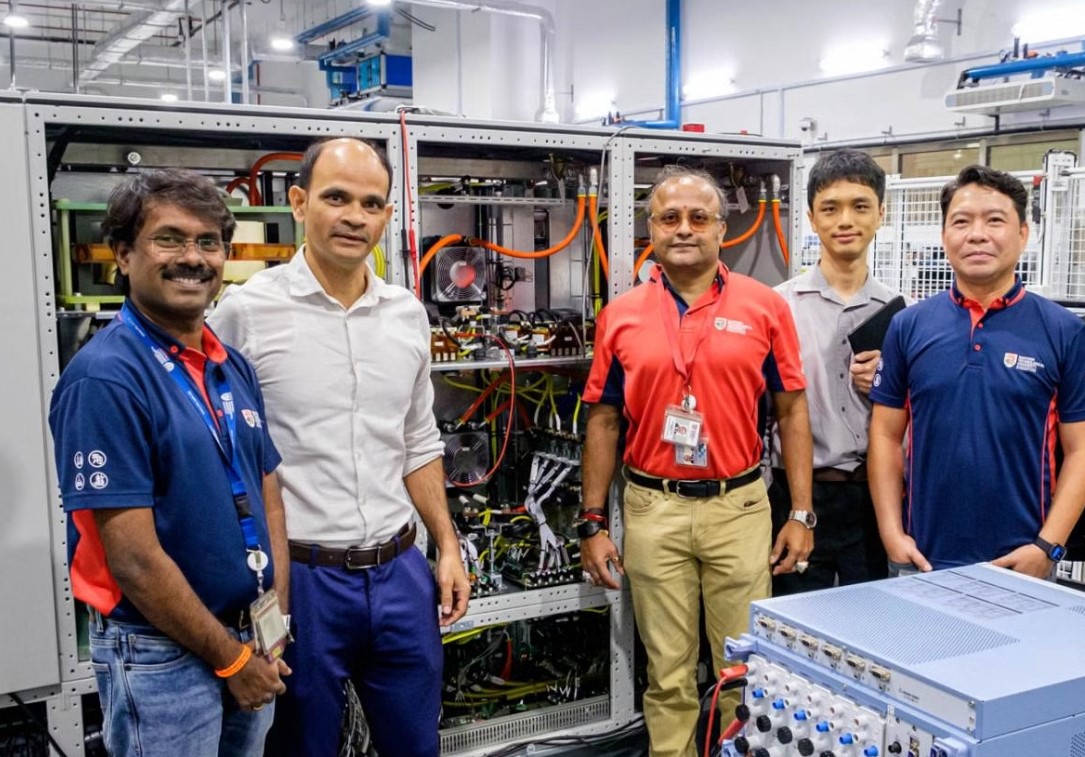NTU deep tech energy spin-off receives $10 million boost for commercialisation
First published online at NTU Singapore
 Image: Members of NTU deep tech spin-off Amperesand include (L-R) Senior Research Engineer Mr Madasamy Palavesha Thevar; Senior Programme Director, Future Mobility Solutions & Advanced Power Electronics Dr Anshuman Tripathi; Principal Research Fellow Dr Vaisambhayana Brihadeeswara Sriram, Senior Research Engineer Mr Yeo Howe Li; and Programme Director, Future Mobility Solutions, Mr Gil Opina Jr, with the solid state transformer prototype at the Energy Research Institute @ NTU.
Image: Members of NTU deep tech spin-off Amperesand include (L-R) Senior Research Engineer Mr Madasamy Palavesha Thevar; Senior Programme Director, Future Mobility Solutions & Advanced Power Electronics Dr Anshuman Tripathi; Principal Research Fellow Dr Vaisambhayana Brihadeeswara Sriram, Senior Research Engineer Mr Yeo Howe Li; and Programme Director, Future Mobility Solutions, Mr Gil Opina Jr, with the solid state transformer prototype at the Energy Research Institute @ NTU.
NTU deep tech spin-off Amperesand is poised to get a $10 million boost, to commercialise technology that could allow electric vehicles (EVs) to be charged more efficiently.
It is the first start-up to benefit from a S$75 million pilot programme led by Temasek to accelerate the creation of successful deep tech start-ups from the pipeline of research at NTU and NUS. This was announced by Deputy Prime Minister, Coordinating Minister for Economic Policies, Mr Heng Swee Keat at Temasek’s annual RIE Industry Day.
Amperesand is poised to disrupt the way energy grids are managed and how electricity is distributed, with its Solid-State Transformers (SSTs) technology, which comprise over a dozen cutting-edge deep tech Intellectual Properties developed by scientists from the Energy Research Institute @NTU (ERI@N). As the country gears up for the wider adoption of EVs, Amperesand’s proprietary equipment will facilitate a smarter way of converting and controlling electrical energy to and from the grid.
Co-founder of Amperesand, Dr Anshuman Tripathi, who is also the senior programme director of future mobility systems and power grids at ERI@N, said that unlike conventional transformers, which need extra equipment to convert alternating current to direct current and vice versa, SSTs can regulate all these functions seamlessly in one unit.
The start-up aims to be the first in the world to commercialise a modular SST that can be scaled up for multi-megawatt fast charging of EVs.
Separately, NTU and NUS is also developing a new common intellectual property (IP) licensing framework by December 2023, aiming to speed up licensing. Firms can then go to a joint IP marketplace to identify and select IP from both institutions. Additionally, companies will also benefit from a deferred payment structure for licensing fees, applicable up to $1 million in revenues or until the deferment period ends.














/enri-thumbnails/careeropportunities1f0caf1c-a12d-479c-be7c-3c04e085c617.tmb-mega-menu.jpg?Culture=en&sfvrsn=d7261e3b_1)

/cradle-thumbnails/research-capabilities1516d0ba63aa44f0b4ee77a8c05263b2.tmb-mega-menu.jpg?Culture=en&sfvrsn=1bc94f8_1)






